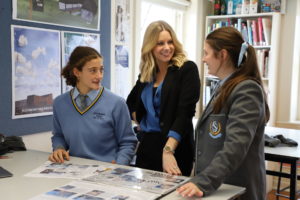Expert or Experienced?
THE THINKING AGENDA:
Reflective Practice in Professional Learning Teams
There is a significant body of research that links effective teaching to the reflective capacity of a teacher. In drawing a distinction between experienced and expert teachers, Hattie (2003) explains how an expert teacher:
- Adopts a problem-solving stance to their work.
- Are more opportunistic and flexible in their teaching, always seeking to take advantage of new information and seeking new interpretations, rather than relying on previous knowledge or experience.
- Carefully monitor their ongoing solution attempts in the classroom, checking for accuracy and updating their approach, as necessary.
Thus, while time spent in the classroom is necessary for building expertise, it is not sufficient. Indeed, it is the critical reflective time outside of the classroom, in discussion with knowledgeable peers and coaches, which allows teacher expertise and collective efficacy to develop. The Grattan Institute (2022) has identified the provision of teacher time for collaboration as integral to making gains in student learning outcomes.
Throughout 2021 and 2022, our professional learning has focused on the development of reflective practice in our teaching staff, in line with our Teaching for Thinking project, the development of the Senior Years Learning Model and whole School Learning Framework. Teachers reflect, design, and collaborate with reference to our new learning competencies and dispositions, which ensures that our strategic plan can be actualised in the classroom.
Throughout the academic year, staff meet regularly in cross-faculty teams (led by a learning coach) focused on a specific Year level, as part of a purposeful effort to work collaboratively to improve the learning competency of the students in that Year level. From these discussions, staff then engage in reflective practice, identifying an area for development based on their knowledge of the students and linked to our School learning competencies. From this point, they design an action plan around the pedagogical imperatives of modelling, scaffolding, and coaching, and then seek to implement it in their teaching. Later, they collect evidence of student learning and reflect on the impact of their project, often making small adjustments for further improvement.
In 2021, such collaborative work resulted in some terrific initiatives and learning outcomes from an expert staff. We were spoilt for choice in sharing practice, and able to open our academic year with two outstanding projects from Head of English, Ms Mary-Anne Keratiotis and Dean of Academics Mrs Alison Cassidy, who generously shared their process with their colleagues, demonstrating the open-minded, critical stance to their own practice that is so necessary to teacher expertise.
This year in our professional learning teams, the ideas have already been impressive, with teams of teachers working together on designing projects around imperatives such as:
- Increasing the metacognitive capacities of senior students to assist them in acting purposefully on feedback and improving deliberate practice.
- Developing independence in Year 9 students through faculty-focused signature programs, to equip them with the skills necessary for transition into the senior years.
- Using scaffolding tools such as thinking routines and online tutorials in Year 10, to improve student self-efficacy.
I look forward to reporting back on the continuously amazing and professional work of my colleagues as the year progresses.



